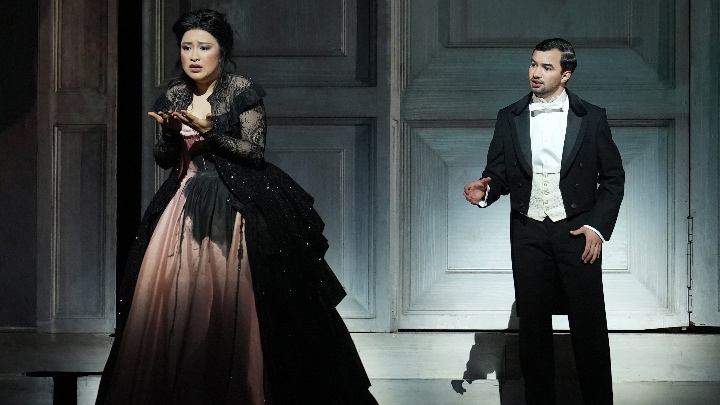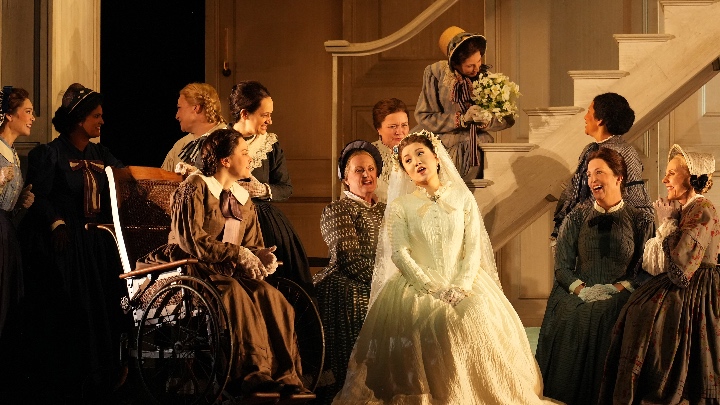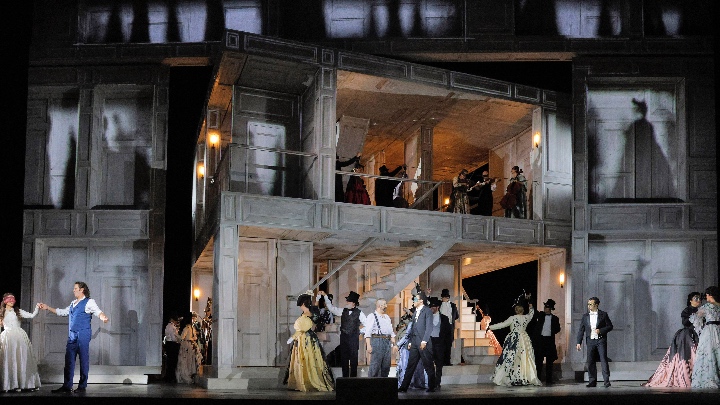
In James Conlon’s essay to accompany LA Opera’s opening production of the 2023 season, “Don Giovanni, the Unknowable, a Classical Antihero” he states specifically that, “The music’s ‘moral’ position concerning the protagonist is clear and, despite much of the literary musing of subsequent centuries, remains unmistakable. The moral decay, the cruelty and malignant antisocial narcissism of the man we know as Don Giovanni, who randomly seduced, betrayed and abandoned, merited a powerful and definitive punishment.”
Regrettably, while he mentions moral decay, he forgets to warn of the effects of tooth decay which is how yours truly ended up at the oral surgeon instead of at opening night of the opera this year. Finally extracted and stitched, I found myself at the fourth performance of six Saturday at the Dorothy Chandler downtown.
Oh, Don Giovanni, how do I love thee? Let me count the recordings and the blu-rays. Truth be told, I’ve been a member in good standing of the “Don Giovanni Record of the Month Club” for nearly 40 years now, but I’d never seen a live performance. I love it, truly, just not that much. The second act has its longueurs (I’m sorry it’s true…the graveyard and the bit with the disguise). Plus it tends to be like any true masterwork; on some level you’re always going to walk away disappointed with something.
Luckily the disappointments last evening were few and mostly involving those who were trying far too hard rather than not enough. Musically however, I can say that the presentation was nearly faultless which is, in many ways, extraordinary.
I also think that this is more than partially attributed to the fact that Christopher Koelsch, our CEO, continues to hire a core group of singers, based on repertory, building a real ensemble and allowing them to grow within and outside of those structures. Many of last night’s performers have been seen over the past years in multiple roles with the company that interconnect musically and dramatically in one way or another and it only makes for a richer experience. Lucas Meachem and Craig Colclough, our Don Giovanni and Leporello, were the Count and Figaro in our recent production of Nozze while Mr. Meachem and Guanqun Yu, our Donna Anna, both had leading roles in our Ghosts of Versailles back in 2015.
The existing production directed by Kasper Holton, here entrusted to Greg Eldridge, debuted at London’s Royal Opera Covent Garden back in 2014 and was planned initially for our 2021 season with an entirely different cast. Mr. Holten’s production team included the formidable designer Es Devlin who was responsible for the Royal Opera’s last production of Les Troyens, some absolutely mind-blowing art installations, theater designs, and massive arena shows like the London & Rio Olympic ceremonies plus productions for a host of pop stars including U2, The Rolling Stones, and Adele.
It becomes clear fairly quickly that Mr. Holton’s conceit is that the story is taking place in Don Giovanni’s head which is represented by an M.C. Escher-style maze of rooms and stairs, built two-stories tall on a turntable. It comes populated with the ghosts of those he’s murdered as well his former assault victims. While the abundant projected graphics imagery make a spectacular impression, key moments musically and dramatically get lost in, or were overpowered by, the blaze of technology. I will say that when it did work, and the visual representation was equal to the story, like in the “Champagne” aria and the Act II Sextet, it was thrilling. However there were more than a few moments where what was happening in the story was contradicted by the action on the stage. I’m not against making the audience question the reality the director wants but for a staging to be satisfying to those of us sitting out there in the dark, like the recent Simon Stone Lucia, it has to be clear. Ambiguity just breeds confusion and then eventual disengagement.
But I was there for the music, and the cast, even with an unexpected debutante, did not disappoint in the slightest.
The Commendatore was Peixin Chen and the man literally sounds like he’s walking around with a microphone. If I hadn’t heard him already as the King in our recent Aida I wouldn’t have believed he wasn’t amplified. This is an astonishing voice and perfect for Mozart’s vengeful father. His contribution made the penultimate scene gripping.
Meigiu Zhang and Alan Williams were well-matched as Zerlina & Masetto. Mr. Williams made a fine impression in what can be a thankless role but Ms. Zhang was enchantment itself. So beautifully poised and vivacious in all her arias and she made each of them individual and memorable.
Our debutante was Tiffany Townsend who was stepping in, for the second time, for an indisposed Isabel Leonard as Donna Elvira. Truth be told, Elvira is my favorite character in almost all of opera and considering the circumstances, I think Ms. Townsend did justice to the role and the very complicated staging. I would call her voice a medium-weight spinto soprano (to be) with very solid technique with surprisingly clean separation on her fioratura. By the time we got to “Mi tradì” she was obviously enjoying the challenges before her and the audience showed their appreciation.
The biggest surprise of the evening came when our Don Ottavio launched into “Dalla sua pace” and made real music out of it from the very first phrase. Anthony Leon has a forward momentum to his singing that transformed an aria that I have always found plodding (at best) into a treasurable musical experience. His technical ease allowed him to turn his Act II showstopper into just that and no one’s oxygen mask had to be deployed for emergencies, least of all his. His singing is worth the price of your ticket alone and I never thought I’d write those words about a Don Ottavio.
His perpetually betrothed was played by Guanqun Yu as Donna Anna and she’s another treasurable artist I’ve enjoyed in a number of roles here since her debut in Ghosts of Versailles. It’s a soft-grained voice, not cut from the standard steel that many prefer in this part, but she was incisive in recitatives most especially in the lead up to her terrifying revelation in Act I. She positively glittered in her two big showpieces and she added some very flattering ornaments that further solidified her interpretation. Brava.
As I mentioned, our Leporello & Don had an ongoing relationship as servant and employer from last season’s Nozze di Figaro. With so much interaction between the two characters it would be an understatement to say they worked well together even in the most minute intricacies of this staging. Mr. Colclough’s Leporello was primarily hilarious throughout. He also made such a meal of his “Catalog” aria that he got spontaneous applause at the end of the first section. One thing I will say is that the use of the turntable and the projections did make the switched identities business in Act II believable.
Mr. Meachem made a spectacular Don Giovanni. He was menacing when warranted and fabulously seductive in both the duet with Zerlina and later in “Deh, vieni alla finestra” (the second verse of which he delivered in a shimmering whisper). He took “Fin ch’han dal vino” at a breakneck pace and, together with the visuals, it did become one of the highlights of the evening. He also had some very tricky business in the finale that he managed to pull off in spite of the choices the director made.
In the pit James Conlon led the players of the LA Opera Orchestra to glory. I especially enjoyed the surprisingly forceful kettle drums at that very first D-minor chord. Keeping some of these ensembles together is tricky enough without having to deal with a two-story rotating set that isolates the singers from each other. The Act II Sextet was just one case where I don’t think any of the cast could actually hear each other well considering half of them were on different floors from the other. He’s such a splendid accompanist and I was especially thrilled with the finale of Act I with the two string quartets onstage and how well he managed to coordinate all of that.
Costumes by Anja Vang Kragh were in the Victorian period for no particular reason with some fantastical elements for the ladies that did manage to be flattering. Lighting by Bruno Poet worked hand in hand with the projections of Luke Halls and I don’t know how they actually managed to pull off all this technical wizardry on a jumbo-sized lazy susan but there were more than a few times I wished for something a tad more austere.
Two performances remain and just for the music making alone it should be experienced.
Photos by JC Olivera





























Comments